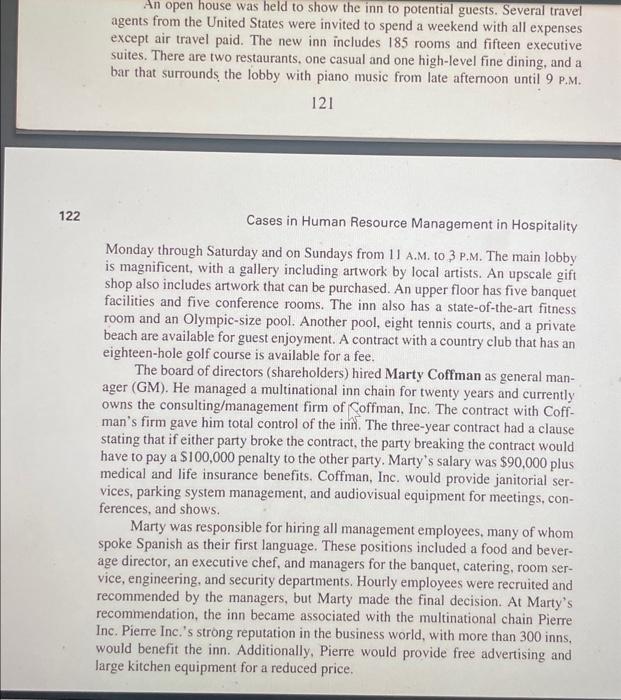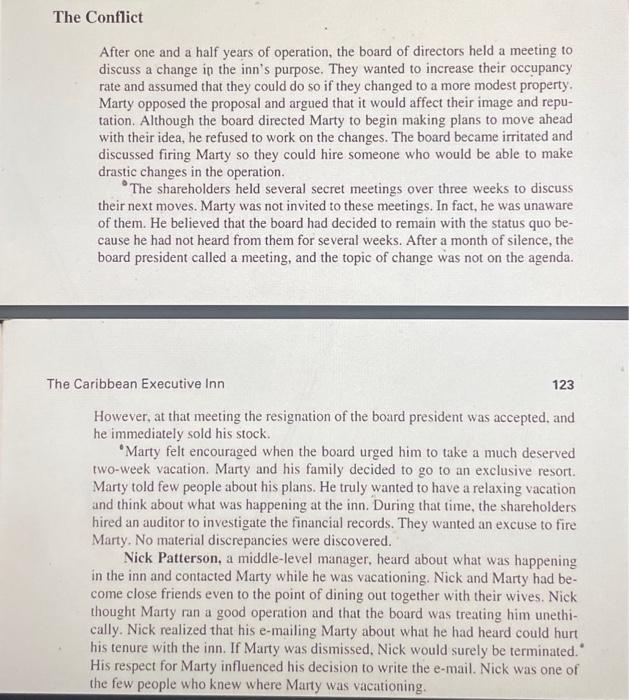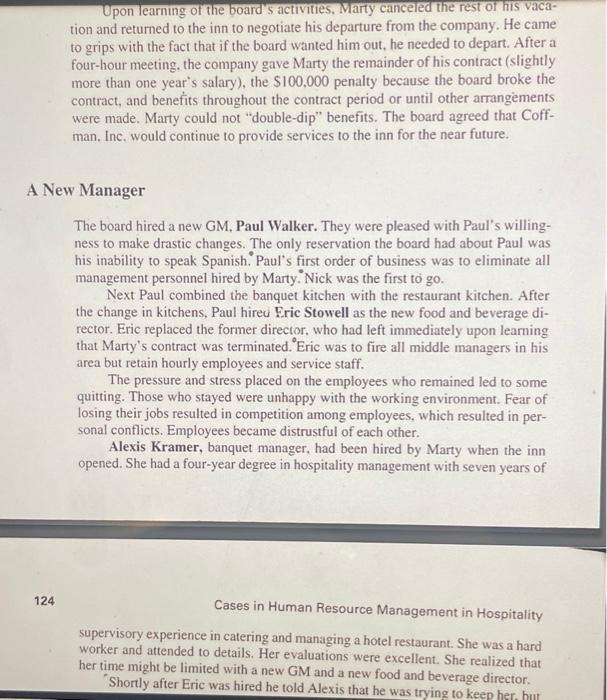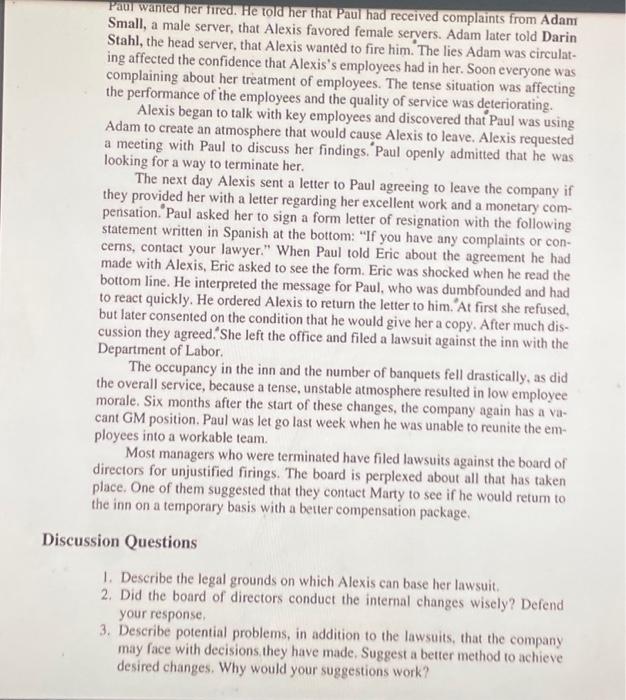can someone pls help me with this case study?
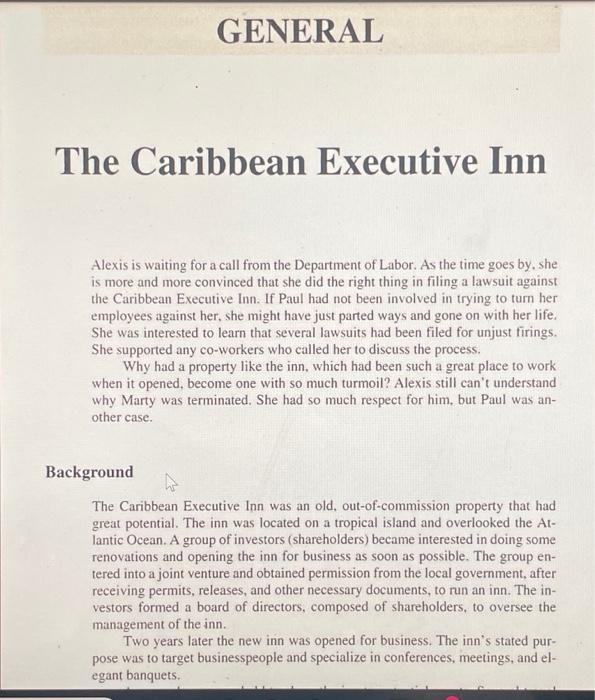
The Caribbean Executive Inn Alexis is waiting for a call from the Department of Labor. As the time goes by, she is more and more convinced that she did the right thing in filing a lawsuit against the Caribbean Executive Inn. If Paul had not been involved in trying to turn her employees against her, she might have just parted ways and gone on with her life. She was interested to learn that several lawsuits had been filed for unjust firings. She supported any co-workers who called her to discuss the process. Why had a property like the inn, which had been such a great place to work when it opened, become one with so much turmoil? Alexis still can't understand why Marty was terminated. She had so much respect for him, but Paul was another case. Background The Caribbean Executive Inn was an old, out-of-commission property that had great potential. The inn was located on a tropical island and overlooked the Atlantic Ocean. A group of investors (shareholders) became interested in doing some renovations and opening the inn for business as soon as possible. The group entered into a joint venture and obtained permission from the local government, after receiving permits, releases, and other necessary documents, to run an inn. The investors formed a board of directors, composed of shareholders, to oversee the management of the inn. Two years later the new inn was opened for business. The inn's stated purpose was to target businesspeople and specialize in conferences, meetings, and elegant banquets. An open house was held to show the inn to potential guests. Several travel agents from the United States were invited to spend a weekend with all expenses except air travel paid. The new inn includes 185 rooms and fifteen executive suites. There are two restaurants, one casual and one high-level fine dining, and a bar that surrounds the lobby with piano music from late afternoon until 9 P.M. 121 Cases in Human Resource Management in Hospitality Monday through Saturday and on Sundays from 11 A.M. to 3 P.M. The main lobby is magnificent, with a gallery including artwork by local artists. An upscale gift shop also includes artwork that can be purchased. An upper floor has five banquet facilities and five conference rooms. The inn also has a state-of-the-art fitness room and an Olympic-size pool. Another pool, eight tennis courts, and a private beach are available for guest enjoyment. A contract with a country club that has an eighteen-hole golf course is available for a fee. The board of directors (shareholders) hired Marty Coffman as general manager (GM). He managed a multinational inn chain for twenty years and currently owns the consulting/management firm of Coffman, Inc. The contract with Coffman's firm gave him total control of the inn. The three-year contract had a clause stating that if either party broke the contract, the party breaking the contract would have to pay a $100,000 penalty to the other party. Marty's salary was $90,000 plus medical and life insurance benefits. Coffman, Inc. would provide janitorial services, parking system management, and audiovisual equipment for meetings, conferences, and shows. Marty was responsible for hiring all management employees, many of whom spoke Spanish as their first language. These positions included a food and beverage director, an executive chef, and managers for the banquet, catering, room service, engineering, and security departments. Hourly employees were recruited and recommended by the managers, but Marty made the final decision. At Marty's recommendation, the inn became associated with the multinational chain Pierre Inc. Pierre Inc.'s strong reputation in the business world, with more than 300 inns, would benefit the inn. Additionally, Pierre would provide free advertising and large kitchen equipment for a reduced price. The Conflict After one and a half years of operation, the board of directors held a meeting to discuss a change in the inn's purpose. They wanted to increase their occupancy rate and assumed that they could do so if they changed to a more modest property. Marty opposed the proposal and argued that it would affect their image and reputation. Although the board directed Marty to begin making plans to move ahead with their idea, he refused to work on the changes. The board became irritated and discussed firing Marty so they could hire someone who would be able to make drastic changes in the operation. - The shareholders held several secret meetings over three weeks to discuss their next moves. Marty was not invited to these meetings. In fact, he was unaware of them. He believed that the board had decided to remain with the status quo because he had not heard from them for several weeks. After a month of silence, the board president called a meeting, and the topic of change was not on the agenda. he Caribbean Executive Inn 123 However, at that meeting the resignation of the board president was accepted, and he immediately sold his stock. 'Marty felt encouraged when the board urged him to take a much deserved two-week vacation. Marty and his family decided to go to an exclusive resort. Marty told few people about his plans. He truly wanted to have a relaxing vacation and think about what was happening at the inn. During that time, the shareholders hired an auditor to investigate the financial records. They wanted an excuse to fire Marty. No material discrepancies were discovered. Nick Patterson, a middle-level manager, heard about what was happening in the inn and contacted Marty while he was vacationing. Nick and Marty had become close friends even to the point of dining out together with their wives. Nick thought Marty ran a good operation and that the board was treating him unethically. Nick realized that his e-mailing Marty about what he had heard could hurt his tenure with the inn. If Marty was dismissed. Nick would surely be terminated." His respect for Marty influenced his decision to write the e-mail. Nick was one of the few people who knew where Marty was vacationing. Upon learning of the board's activities, Marty canceled the rest of his vacation and returned to the inn to negotiate his departure from the company. He came to grips with the fact that if the board wanted him out, he needed to depart. After a four-hour meeting, the company gave Marty the remainder of his contract (slightly more than one year's salary), the $100,000 penalty because the board broke the contract, and benefits throughout the contract period or until other arrangements were made. Marty could not "double-dip" benefits. The board agreed that Coffman, Inc. would continue to provide services to the inn for the near future. New Manager The board hired a new GM, Paul Walker. They were pleased with Paul's willingness to make drastic changes. The only reservation the board had about Paul was his inability to speak Spanish. Paul's first order of business was to eliminate all management personnel hired by Marty. Nick was the first to go. Next Paul combined the banquet kitchen with the restaurant kitchen. After the change in kitchens, Paul hireu Eric Stowell as the new food and beverage director. Eric replaced the former director. who had left immediately upon learning that Marty's contract was terminated. Eric was to fire all middle managers in his area but retain hourly employees and service staff. The pressure and stress placed on the employees who remained led to some quitting. Those who stayed were unhappy with the working environment. Fear of losing their jobs resulted in competition among employees, which resulted in personal conflicts. Employees became distrustful of each other. Alexis Kramer, banquet manager, had been hired by Marty when the inn opened. She had a four-year degree in hospitality management with seven years of 24 Cases in Human Resource Management in Hospitality supervisory experience in catering and managing a hotel restaurant. She was a hard worker and attended to details. Her evaluations were excellent. She realized that her time might be limited with a new GM and a new food and beverage director. Shortly after Eric was hired he told Alexis that he was trying to keep her. but Paul wanted her fired. He told her that Paul had received complaints from Adam Small, a male server, that Alexis favored female servers. Adam later told Darin Stahl, the head server, that Alexis wanted to fire him. The lies Adam was circulating affected the confidence that Alexis's employees had in her. Soon everyone was complaining about her treatment of employees. The tense situation was affecting the performance of the employees and the quality of service was deteriorating. Alexis began to talk with key employees and discovered that Paul was using Adam to create an atmosphere that would cause Alexis to leave. Alexis requested a meeting with Paul to discuss her findings. Paul openly admitted that he was looking for a way to terminate her. The next day Alexis sent a letter to Paul agreeing to leave the company if they provided her with a letter regarding her excellent work and a monetary compensation."Paul asked her to sign a form letter of resignation with the following statement written in Spanish at the bottom: "If you have any complaints or concerns, contact your lawyer." When Paul told Eric about the agreement he had made with Alexis, Eric asked to see the form. Eric was shocked when he read the bottom line. He interpreted the message for Paul, who was dumbfounded and had to react quickly. He ordered Alexis to return the letter to him. "At first she refused, but later consented on the condition that he would give her a copy. After much discussion they agreed."She left the office and filed a lawsuit against the inn with the Department of Labor. The occupancy in the inn and the number of banquets fell drastically, as did the overall service, because a tense, unstable atmosphere resulted in low employee morale. Six months after the start of these changes, the company again has a vacant GM position. Paul was let go last week when he was unable to reunite the employees into a workable team. Most managers who were terminated have filed lawsuits against the board of directors for unjustified firings. The board is perplexed about all that has taken place. One of them suggested that they contact Marty to see if he would retum to the inn on a temporary basis with a better compensation package. Discussion Questions 1. Describe the legal grounds on which Alexis can base her lawsuit. 2. Did the board of directors conduct the internal changes wisely? Defend your response, 3. Describe potential problems, in addition to the lawstits, that the company may face with decisions, they have made. Suggest a better method to achieve desired changes. Why would your suggestions work


